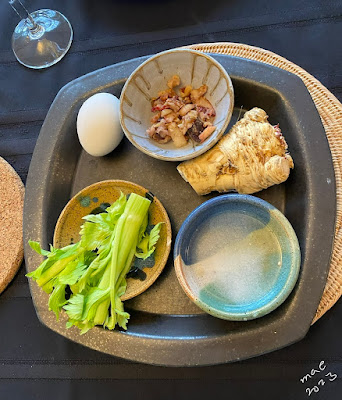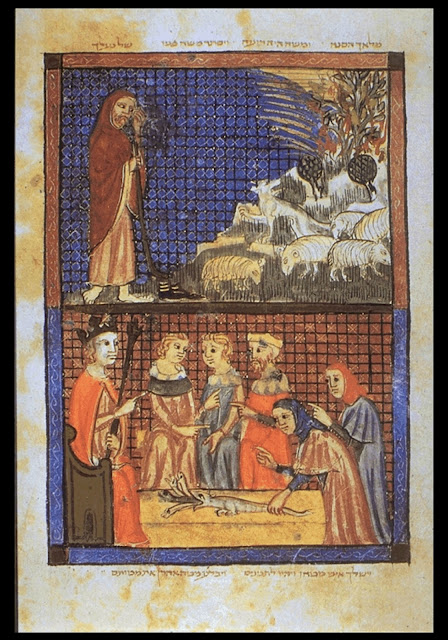In our Passover Seder we use the Haggadah illustrated above, with illustrations by the American artist and sculptor Leonard Baskin. His water colors are very delightful and modern. Our Seder this year was short and very nice.
 |
| The Seder plate with greens, salt water, charoset, and a horseradish root. Missing: a shank bone. These are the symbols used to tell the Passover story during the Seder. |
 |
| Our table, including the Haggadahs, ready for our guests. The Seder celebrates the Exodus of the Jews from Egypt under the leadership of Moses, Aaron, and Miriam. |
The Haggadah: Traditions of Illustrations and Text
The origins of the Haggadah, the book detailing the order of prayers and readings for the Passover ritual, begin with the rabbis who lived around the third and fourth centuries of the common era. These scholars and sages based some of the rituals on the traditional celebrations of the Passover holiday in the Temple before its destruction. The Haggadah as we know it now includes many additions made during the following centuries. Hand-written Haggadahs in museum collections date to as early as the tenth century, and printed Haggadahs were first produced in the fifteenth century in Soncino, Italy, not long after the introduction of printed books in Europe.
 |
| The Plagues: Boils, pestilence, frogs, and wild animals visited on the Egyptians. From “The Golden Haggadah,’ 1320. (British Museum) |
 |
| Illustration of the song "An Only Kid" from a Haggadah by Eliezer Lissitzky , 1917. The addition of this song to the Seder ritual probably dates from the 15th century. |
 |
| Page from the Sarajevo Haggadah, 14th century Catalonia. Top of page: Moses and the Burning Bush. Bottom of page: Aaron and the Magicians. |
 |
| A page from a 15th century German Haggadah. Each of the figures is holding a book: that is, a Haggadah. |



Hello,
ReplyDeleteHappy Passover! Your Seder sounds nice. I have been to a few traditional Seder dinners with my husband. Have a wonderful day!
Pessach is a wonderful feastday - or week! Your Seder table looks great. Your Haggadah looks lovely, too. Valerie
ReplyDeleteHappy Passover. Great looking books.
ReplyDeleteHappy Passover!!
ReplyDeleteHappy Passover, enjoy and thank you for the info.
ReplyDeleteSo mucch of this is new and rather foreign to me. I am glad you are sharing your Seder table and information with us. Have a blessed Passover, Mae.
ReplyDeleteThank you for sharing your celebration of Passover with us. Lovely.
ReplyDeleteI love the cover of your Haggadah -- I'll bet the illustrations are wonderful. Certainly all the ones you showed are beautiful. And your Passover table is lovely and I really appreciate the ritual of it. I'm sure your guests were very happy at that table indeed. Wishing you a lovely Passover.
ReplyDeleteSuch amazing pictures Mae. Does one say Happy Passover? Anyways have a nice break.
ReplyDeleteChag Pesach Sameach, Mae.
ReplyDeleteHello Mae,
ReplyDeleteThe Haggadah illustrations are wonderful. Your table looks lovely. Happy Passover to you and yours! Thank you for linking up and sharing your post! Take care, have a happy weekend! PS, thank you for leaving me a comment
Happy Passover Mae, and thank you for sharing the rituals of your faith. Your Haggadah prayer book is lovely and I enjoyed seeing the ancient illustrations.
ReplyDeleteAll the best.
How wonderful to read about your celebrations. And what a lovely table you set! Enjoy your weekend!
ReplyDelete